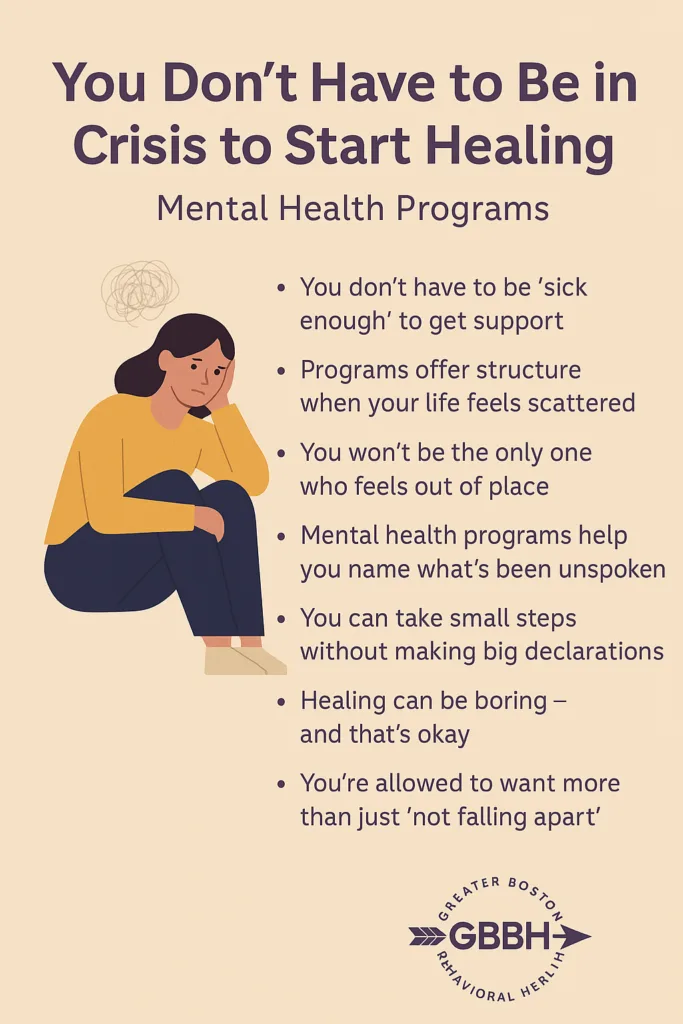I used to think “mental health program” meant you had to be falling apart—like, full-blown crisis mode.
But when I finally walked into one? I wasn’t in crisis. I was just… done. Done faking fine. Done trying to outthink my way out of sadness. Done staying silent because I didn’t have the “right” kind of problem.
If any of that hits home, you’re not alone. And you don’t have to keep waiting for things to get worse before you ask for help.
Here’s what I wish someone had broken down for me when I was newly diagnosed, overwhelmed, and Googling mental health help at 2 a.m.—half hopeful, half panicking.
1. You don’t have to be “sick enough” to get support
One of the most damaging lies we tell ourselves is that things aren’t bad enough to justify help.
I had a diagnosis. I had symptoms. But because I could still go to work, still show up for my friends (at least sometimes), still crack a joke when needed—I convinced myself I was fine.
Here’s the truth: Struggling quietly doesn’t make you any less deserving of support. Mental health programs aren’t just for the edge-of-crisis moments. They’re for anyone who wants to feel better. Anyone who’s tired of living in survival mode.
2. Programs offer structure when your life feels scattered
When your emotions are all over the place, it helps to have something stable—something with a rhythm that holds you when you can’t hold yourself.
That’s what a mental health program gave me: structure without pressure. A schedule that helped me get out of bed. People who expected me to show up—but didn’t judge me if I cried the whole session.
In Boston, programs like the ones at Greater Boston Behavioral Health offer flexible schedules that meet you where you are. You don’t need to be inpatient to get consistent, compassionate care.
3. You won’t be the only one who feels out of place
The first time I sat in a group room, I almost turned around and left. Everyone looked like they had it figured out. Like they belonged.
But as people started sharing, something shifted. Their words cracked open the illusion. I heard versions of my own thoughts—spoken out loud by strangers who suddenly didn’t feel like strangers at all.
You don’t have to “match” someone else’s diagnosis or backstory to be in the right room. If your heart is tired and your mind feels heavy, that’s enough.
4. Mental health programs help you name what’s been unspoken
Sometimes it’s not about having the perfect language. It’s about finding a space where you can start to put words to the fog.
My therapist didn’t expect me to come in with a clear story. She helped me untangle the knot slowly, piece by piece. Group sessions gave me phrases I didn’t know I needed—“emotional exhaustion,” “quiet panic,” “functional depression.”
Once you start naming things, they stop owning you.
5. You can take small steps without making big declarations
I didn’t tell anyone I was starting therapy. Not because I was ashamed, but because I wasn’t ready to explain it yet. I needed it to be mine for a while.
Mental health care doesn’t require a public announcement. You don’t have to tell your job, your family, or your friends right away. You get to choose what you share and when. You’re allowed to protect your healing while it’s still new.
6. Healing can be boring—and that’s okay
No one told me this, but it matters: some days in a mental health program are just… boring. You show up. You talk. You leave. Nothing explodes. No epiphany.
But something still shifts.
Those boring days are where trust grows. Where your nervous system starts to exhale. Where your brain learns what safety feels like again.
Progress isn’t always loud. Sometimes it’s quiet and steady and deeply sacred.
7. You’re allowed to want more than just “not falling apart”
The bar doesn’t have to be survival. You’re allowed to want joy. Ease. Connection. To laugh without that tightness in your chest. To wake up and not dread the day.
Mental health programs don’t just stabilize symptoms. They help you rebuild your inner life—the parts that got buried under the weight of pretending everything was okay.
At Greater Boston Behavioral Health, that kind of rebuilding happens with real people, real support, and no pressure to perform.
FAQ: What You Might Be Wondering About Mental Health Programs
What is a mental health program, exactly?
It’s structured care for people struggling with mental health. It can include individual therapy, group therapy, medication support, and more. There are different levels—some are intensive (like partial hospitalization or IOP), and some are more flexible, like weekly outpatient therapy.
Do I need a diagnosis to join?
Nope. While some programs are diagnosis-specific, many are open to anyone experiencing emotional distress, burnout, anxiety, depression, or trauma symptoms. If something feels off, that’s enough.
What if I’m scared it won’t help?
That fear is real—and valid. Many people feel unsure before starting. But programs are built to walk with you through that doubt, not dismiss it. You don’t have to believe 100% to begin.
Can I keep working while attending a program?
Yes, especially with outpatient options. Many people attend morning or evening sessions so they can maintain work or family responsibilities.
What’s different about programs in Boston?
Greater Boston Behavioral Health knows this community. We’re local, which means our team understands the pace, pressure, and culture of living here. Our programs are rooted in real-world support—not just theory.
Ready to Talk?
If this spoke to you—even a little—please don’t wait for things to “get worse.” You deserve to feel okay. You deserve clarity. You deserve help.
Call (888) 301-8072 to reach out to Greater Boston Behavioral Health. We’ll meet you with respect, not pressure. Let’s talk through your options together.


